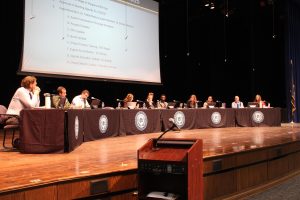Rags from your reaches
April 27, 2022
After months of anxiety-ridden anticipation, an alarming number of South’s graduating seniors recently received that dreaded email rejecting them from their dream college.
Similar disappointments were felt across the country. Acceptance rates, especially among highly competitive universities, have substantially declined within the ’21-’22 application season. While South counselor Beth Walsh-Sahutske didn’t see as much of a difference as many students did, she acknowledges that the broadened reach of highly competitive schools’ already large application pools played a significant role in decreasing acceptance rates.
“Because of test-optional, a lot of people that didn’t feel confident applying to more highly competitive or elite schools decided they were going to give it a run,” Walsh-Sahutske said. “That pushes the numbers up in terms of competition level. We’ve yet to see how that’s going to develop in the next couple years.”
Regardless of testing abilities, members of the graduating class might be feeling the pressure to aim high. After years of observing high school students while offering personality-based college counseling through her website, collegecouselling.com, Robin Groelle believes that many students with steep aspirations for their futures wrongly see Ivy League schools as their only viable option.
“A lot of families are concerned about what they call ‘return on investment,’” Groelle said. “They feel as though those highly named schools with strong reputations are the only ones worth focusing on.”
Despite the hopes students may hold, Groelle said it’s simply impossible to offer some 50,000 applicants places in one university’s freshman class, no matter how qualified or impressive each candidate is.
“The reality is that highly selective colleges could fill their class three or four times over with outstanding students, so they’re denying more students that they would love to have come than they’re accepting,” Groelle said. “Getting a denial doesn’t necessarily mean you couldn’t make it at that school, or that they didn’t find you valuable. It’s just a matter of numbers.”
Nevertheless, rejection always stings. Groelle urges students to think of their results as a denial of their application rather than an outright rejection of them as a person, or else the feeling can easily consume them.
“Highly ambitious students are often very successful,” Groelle said. “They work extremely hard and are able to assess what their goals are. They have a focused approach at achieving them. Whether that be in the athletic field, the classroom, with community service or with leadership, in whatever ways they feel motivated, they take great pride in their achievement. I think they get a great deal of personal identity in that sense of accomplishment. Receiving negative news is difficult for everybody, but I feel that it’s particularly difficult for people who haven’t experienced it yet.”
As a current senior, Vivian Caine ’22 can easily recall the kind of pain that followed the denial from her top college.
“Rejection is super hard to deal with,” Caine said. “It really hurts, especially when you feel like you should be qualified for this, or (you) tried (your) hardest but it just didn’t work out.”
Despite that initial blow, Caine kept her head up. One college decision doesn’t negate years of dedicated academic effort. Applying to transfer into a dream school remains an option, but beyond that, it’s important to recognize that these less renowned colleges still offer incredible opportunities to explore.
“It’s like a breakup,” Caine said. “It’s not you, it’s them. You can survive and keep going and thrive somewhere else. It doesn’t have to just be that one perfect school. It’s hard to remember that in the face of rejection, but I think it really is super important to keep your head up.”














































































